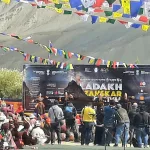In a recent interview to Al Jazeera, Bilawal Bhutto Zardari, former Foreign Minister of Pakistan and current dynastic heir to the Pakistan People’s Party, made headlines by suggesting his country is finally ready to behave. When prompted about UN-designated terrorists Hafiz Saeed and Masood Azhar, Bilawal claimed that, as part of a broader dialogue, Islamabad is open to extraditing ‘individuals of concern’ to India as a confidence-building measure if New Delhi cooperated with it. On the surface, this may sound like a statesman’s flourish. But those who have followed Pakistan’s double games know better.In Pakistan, diplomacy wears two faces. One that speaks fluent English and is used to project an image of moderation, of a nation wronged, misunderstood, and yet open to dialogue. The other that speaks Urdu and Punjabi and tells the real story. The first is meant for Brussels, Washington and Doha. The second, for Bahawalpur, Muridke and the barracks in Rawalpindi.
At domestic rallies, Bilawal’s rhetoric is full of bloodlust, ‘khoon ke badle khoon’, where peace is not even a footnote. There is no room for reconciliation, only threats, revenge and terrorist glorification. Internationally, he speaks Oxford English, offers handshakes and drops words like ‘dialogue’ and ‘de-escalation’.This duplicity is not new. It is baked into the DNA of Pakistan’s military leadership and has long defined the grammar of Pakistani politics. What makes Bilawal’s recent statement exceptional is its absurdity.Hafiz Saeed and Masood Azhar are not underground warlords operating in defiance of state authority or fugitives hiding from the Pakistani state. They operate with the state’s blessing, under the protective umbrella of the ISI and Pakistan Army. They hold public rallies, calling for the destruction of Hindu India. Their actions do not go even an inch against the grain of Islamabad’s policy. They are not hiding. They are being hidden. Their outfits, in every functional sense, are extensions of Rawalpindi’s asymmetric warfare doctrine against India. To suggest they could be extradited is to present the generals’ proxy war as a police case.So when Bilawal speaks of handing over these figures, he is just airbrushing an old deception, framed to look like reform. It is a playbook Pakistan has used for as long as it has existed, feigning reasonableness for global consumption to show Pakistan as the more responsible player in the India–Pakistan equation. But this time, he may have miscalculated the cost of the performance.The backlash was instant. Within hours of the interview, Talha Saeed, son of Hafiz Saeed, released a blistering video. In it, he called his father a national treasure, a man of integrity who had never harmed Pakistan. That line, never harmed Pakistan, is the entire thesis of the Pakistani jihad doctrine. So long as your guns are aimed at neighbours, your sins are forgiven. And Bilawal, by suggesting otherwise, had committed the ultimate political heresy.
This was not just filial loyalty on display. It was a message, coded but clear. Some men are above the Constitution, beyond accountability and outside the realm of political negotiation. You do not barter them. You do not extradite them. You certainly do not invoke their names to impress foreigners. In Rawalpindi’s worldview, they are not liabilities. They are leverage.The reaction revealed more than outrage. It revealed a pathology. A country where the son of a UN-designated terrorist can openly defend his father and find a sympathetic audience is not a nation inching towards reform. It is a state arrested by ideology, where violent men are hero-worshipped and those who question them are labelled traitors. Bilawal didn’t just misread the room. He misread the ecosystem. Or thought he could just get away.It also lays bare the schizophrenia of Pakistan’s domestic and foreign messaging. One face is reserved for the Western interlocutors still obsessed with balance in South Asia, the well-shaven, cosmopolitan Oxonian with progressive credentials. The other is tailored for the base, blood-and-soil nationalism cloaked in Urdu, soaked in martyrdom, and punctuated with threats of annihilation. Bilawal, trained at Oxford and honed in multilateralism, is fluent in both idioms.But his grand diplomatic overture may backfire. The groups he so casually alluded to do not tolerate ambiguity, do not understand nuance and do not care for optics. They operate on ideology, loyalty and vengeance.To suggest, even hypothetically, that their leaders could be handed over to India is blasphemy. And in Pakistan, blasphemy carries consequences.
Political figures in Pakistan have paid dearly for smaller infractions. In a state where terror networks enjoy deep immunity, Bilawal’s statement may be seen as more than a gaffe. It may be read as defiance or worse, treachery.The ISPR’s public silence so far is not reassuring either.Talha Saeed’s quick rebuke was not just a son supporting his father. It was an informal communiqué, one that bypasses bureaucracies and goes straight to the bloodstream of Pakistani politics. A coded warning from the jihadist syndicate to Pakistan’s political class. There are lines you do not cross, not even in English. Pakistan’s proxy gods cannot be disowned or bartered for international brownie points. You do not speak of handing over the state’s favourite sons, not even in passing.
Bilawal, more than most, should have known this. He inherited not just a political legacy but also the warnings embedded in it. He knows the limits of the permissible. And yet, he chose to overstep, perhaps in a bid to recast himself as the voice of modernity in a crumbling system. But that crumbling system still bites.
The idea that Pakistan is willing to cooperate with India on counter-terrorism if India plays along is laughable, even insulting. There is no mutuality here. India has already cooperated more than enough. It has submitted reams of dossiers to Pakistan, concrete evidence, intercepted calls, GPS logs and even testimonies from captured terrorists. The real question is whether Pakistan will ever abandon its toxic doctrine of strategic depth. And if history is any indicator, the answer is no.Pakistan is not a victim of terror. It is the ideological parent of it. That is why Bilawal’s remarks ring hollow. And India has seen this movie too many times before, offers of cooperation followed by refusals to act. trying to appear more reasonable than Rawalpindi allows, Bilawal may have signalled a fault line within Pakistan’s internal power structures and wandered into dangerous territory. His comments could easily be seen by the security establishment as an unpardonable sin in Pakistan’s military-run ecosystem. That is how civilian leaders end up being corrected, not with memos but with midnight knocks, study tours abroad, jail or worse.Bilawal’s family history offers enough cautionary tales. His father, Asif Ali Zardari, was imprisoned for years in politically motivated cases. Nawaz Sharif learnt it harder, disqualified and politically gutted for defying Rawalpindi’s diktats. Imran Khan, the army’s blue-eyed boy until he was not, now sits sidelined and jailed after serving his term as puppet-in-chief. Hussain Shaheed Suhrawardy died in exile, allegedly poisoned for challenging military rule.Liaquat Ali Khan, Pakistan’s first Prime Minister, was gunned down while resisting creeping army influence. And the great irony, Fatima Jinnah, the Mother of the Nation, was branded an Indian agent and a traitor by the Ayub Khan regime’s propaganda arm. State-controlled Radio Pakistan, Zulfikar Ali Bhutto and Ayub’s loyalist Altaf Gauhar led the smear campaign, accusing her of being a foreign puppet and Hindu sympathiser. In Pakistan, even Jinnah’s sister was not safe from the wrath of the establishment.
Benazir Bhutto, Bilawal’s mother, wasn’t spared either. Despite courting the military and calling for jihad in Kashmir during her premiership, she ultimately fell victim to the very ideology she once legitimised. Her assassination remains the most chilling reminder till today of what happens when Pakistan’s civilians try to steer the state away from its militarised, jihadist trajectory.The message is timeless. In Pakistan, the moment you believe you are free to make policy, you are reminded who really does. And that reminder rarely comes in polite form.Bilawal has now edged dangerously close to that line. Whether out of genuine reformist instinct or diplomatic miscalculation is irrelevant. The reaction is already loading. It may come dressed as clarification. It may come with editorial pushback. Or, if the jihadi machinery feels threatened, it may come with more finality, unless GHQ steps in quickly to contain the aftershocks.In Pakistan’s internal politics, especially where religion and terrorism intersect, consequences are rarely symbolic. And the last thing bad actors want is a political class that publicly disowns them. That would make their jihad harder to justify, even within Pakistan.And even if one grants Bilawal the benefit of sincerity, his timing and framing were reckless. Pakistan’s international image is in tatters, its economy in freefall, and its military diplomacy running on fumes. This was an attempt to look respectable without being accountable.The bait and switch was obvious. Bilawal placed the burden on India while absolving Pakistan of its crimes as if Pakistan’s harbouring of terrorists were merely a reaction, not a policy.
And Bilawal’s audience was not India. It was not even the United Nations. It was the West, especially those still willing to believe that Pakistan can be a partner in peace. The problem is not that Pakistan lacks sincerity. The problem is that it fakes it so well. And the West still believes it.India, for its part, sees this episode for what it is: not a breakthrough, not a shift in doctrine, but a bid to whitewash the blacklisted, to repackage proxy war in the language of peace, and to sell it to an audience too eager to believe. There is no reset coming from Pakistan. There never was.In the end, Bilawal’s interview was a test balloon floated in English, hoping it would never be translated into Urdu. But it has, loud and clear. And now that the translation is complete, let us see if GHQ hands him a medal or a muzzle.
(Author can be reached at: [email protected])








